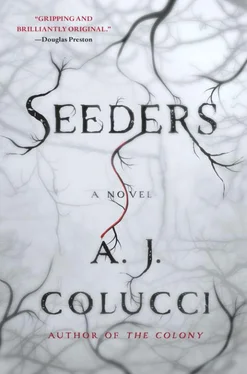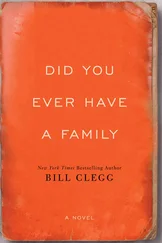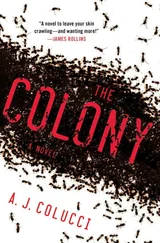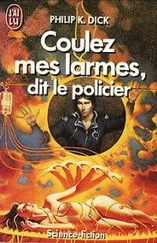“What’s all this?” she asked.
“Nothing.” Jules cleared his throat. “Just an experiment.”
“You certainly found a lot of equipment in that cabinet.” She pushed back the fronds of a fern hooked up to electrodes.
“Don’t touch that, please,” he nearly shouted.
Startled, she was about to ask him why in heavens not, when she noticed the front of his shirt was covered with bits of brown leaves and pine needles. Burrs stuck to his arm and continued down the side of his trousers to his muddy boots. There was a mushroom in his hair.
Isabelle touched his wet sleeve. “Where did you sleep, outside?”
“Of course not,” he snapped. “I was looking for specimens in the woods this morning. Must I now get your permission?”
“No, I—”
“You think I slept on the ground?”
She was put off by his rudeness. Why was he so angry? She did nothing wrong, just brought him some coffee. Certainly no reason to snap at her.
His face showed impatience. “Shouldn’t you be looking for the diamond?”
“I wanted to ask you about that. I found a Bible in the library with a passage underlined. It mentioned the word Eden, just like in my father’s journal. May I see it?”
“I’m afraid you can’t at the moment,” he said coldly.
“Fine, then, maybe later,” she snipped back.
He picked up the steaming mug and stared out the window, saying nothing as though she weren’t in the room. She squared her shoulders and snatched up one of the ferns covered with a fungus.
“So is it ergot or not?”
“I don’t think so.”
“What kind of fungus could it be?”
“What makes you think it’s a fungus?”
“You said it was.”
“Well, I… don’t know.”
Isabelle pursed her lips. She was overly tired and anxious to know what had happened to her father, if the fungus had anything to do with his death. “What do you mean you don’t know? It’s either a fungus or not.”
“It’s not that simple. There’s no fungus in the world that can grow on bark and leaves and grass, and every bloody thing in the forest. I’ve been studying them all night. Truthfully, I’ve never seen anything like it.”
“Then you’re suggesting it’s some new kind of life-form?” she said sarcastically.
“It could be anything, really. Slime mold or a gall, perhaps. A new type of neoplasm that we’ve never seen before.”
With a smirk of defiance, she leaned over the microscope to have a look.
“Please don’t touch that.”
“Why not?”
“You’re not a mycologist, or even a botanist.”
“And you can’t tell the difference between fungus and a gall.”
He pointed with his chin. “Go ahead, then. Have a look.”
She hesitated, but then peered into the lens.
“What do you see?” He sounded curious.
After a moment she said, “The cellular structure of the leaf looks normal, except for these rather hideous microbes shooting out from the leaf. They look like blackish purple tubes. I’d say it’s a fungus.”
“Yes, the dark mass could be sclerotium, and those threadlike stalks most certainly resemble some kind of endophyte, but none I’ve ever seen. Its reproduction and life cycle are completely different from ergot or any other kind of Claviceps, and the fact that it grows on everything; well, it could be some kind of Neurospora mold mutation.” He stared pensively out the window again. “It’s not really the fungus that worries me, but the plants themselves.” He motioned to the desk. “That Eden book. Your father wrote about giving the plants an ability to hear our thoughts, communicate on a cognitive level with humans. Suppose he was right? What if they could read our minds?”
“You can’t be serious.”
“Why not?”
“Because it’s ridiculous,” she said. “Plants can’t think. They don’t have a brain.”
“ Of course, the almighty brain. You think because there’s no organ to study and we can’t see how the information is organized, then plants can’t process thought. It’s all right here.” Jules walked swiftly to the green journal and picked it up, pointing to the text. “The action-potential propagation in all of these plants is comparable to the speed of action potentials in mammalians, specifically one hundred and five meters per second, which is the same velocity as a neuron. The amplitude, duration, relative and absolute refractory periods, depolarization peaks are the same as you’d find in the cognitive regions of the human nervous system.”
Isabelle didn’t understand his pedantic jibber-jabber. Her education in botany stopped at common species identification. “I don’t know what you’re talking about, but what proof do you have besides that silly book?”
For a moment he stared at her. Then he turned to the window, gazing at the trees in the distance. She could barely hear his voice. “I had a strange experience in the woods this morning. I can’t explain it, but it felt as though I wasn’t alone out there. I may have passed out, but I could hear some kind of chatter. Then I felt them, touching my mind.”
“Jules?” Isabelle whispered. “You’ve been up all night. You should go upstairs and rest.”
“They touched my memories.”
“Who?”
His eyes narrowed and she suspected he was only semi-aware of her presence.
“It has something to do with the fungus. Its relationship with the plants that makes it all possible. How they hear our thoughts. Communicate. Understand. Everything is starting to add up.” A smile crossed his lips and he whispered, “Imagine the possibilities.”
“Jules?”
All at once his demeanor changed. He was grinning with excitement, his voice bursting with cheer. “Do you realize the significance of this finding? Isabelle, I’ve been up all night thinking how this could change the entire world. Change my future. Our future.” He walked quickly over beside her and grasped her shoulders, a towering giant looking down into her face. “I want you to be part of this. We can study your father’s research. Figure out how he did it, you and I together.”
Isabelle was stunned and reflexively pushed her hands against his chest, but the feel of his warm body, the hardness of his muscles, stopped her cold. She felt small and helpless under his gaze.
Jules leaned down and kissed her on the mouth, squeezing her arms tight. At first she struggled, but the sensation of his soft lips left her weak.
He jolted back, his expression aghast. “Isabelle, please forgive me. I never—”
She wiped her mouth. “It’s all right, really.”
“No, it’s not. You’re a married woman, and here I am…” His voice trailed off.
“My marriage has been over for years.”
“Oh. I’m sorry.”
She was hesitant to go on. After all, Jules was acting crazy just seconds ago. But now he seemed normal again and looked at her with sympathy. She wished the kiss had happened somewhere else, another time, perhaps twenty years ago. She wanted to pour her heart out to him. “I knew it from the beginning, really. After the kids came it only got worse. I felt stuck, too dead inside to leave. Colin is awful for me, even worse for the kids.”
“I hate to pry, but why did you marry him?”
She shrugged and told him that leaving the island was difficult. She missed her father terribly, but love soon turned to anger. Her mother was a tyrant who never let her out of the house. Isabelle had hoped George would come rescue her.
“He never came to visit, never called?”
Isabelle shook her head, and explained that as she grew older, she was told of her father’s indiscretions, that Dr. George Brookes was a well-known fraud and a drug addict. It was a relief to finally get married and change her surname, leave the solitude of her mother’s house. “I rushed into marriage, thinking it was a way out of a bad situation, but I really wasn’t thinking at all.”
Читать дальше












